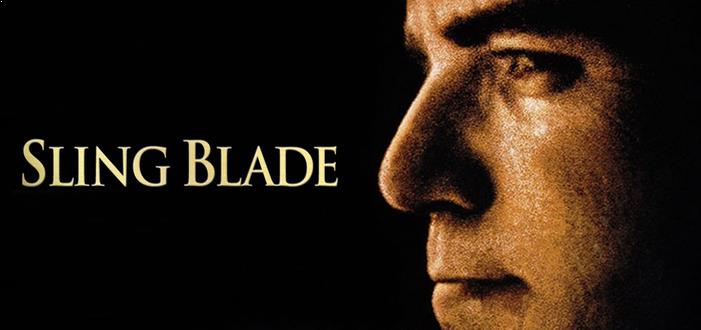
Sling Blade
This is a remarkable creative project by Billy Bob Thornton, who wrote, directed, and starred as a simpleton who has a streak of violence about him. What is terrific about the film is how easy going it appears and how effortless the simple Southern backdrop is to the main plot; a plot which, mind you, never travails very deep. We are thrown into the narrative of this man who is about to be released from a mental institution after being admitted when he murdered his mother and her lover. On the surface he appears to be quote retarded, but this is only because he does not follow or apprehend social convention. Indeed how many are considered “weird” or “strange” because they do not intuitively conform. If anything, such alienation is what sets off alarm bells upon first impressions of such individuals, as if they do not exactly know how to assimilate and properly function within society.
In his instance, the alarm bells are easily reset once it is understood that he cannot function in society because of his intelligent deficiency. If anything, he resembles more an autistic human than an actually mentally deficient individual. He can answer and respond to questions, for instance, but as one character remarks in the film, he appears to be in his own world. And quite possibly so; meaning, he never really was mentally inept, as the film shows him excelling as a machine repairman, only that he was inept at socially adapting.
Sling Blade gives the impression, for almost the entirety of the film, of a positive humanism. It must be said, in other words, that if humans were truly brutish, then at in their simplest form they would resemble beasts, instead of providing joy and love and compassion and understanding to those who surround them. Everyone who incorporated the protagonist into their lives became better human beings, and this is said in a laudatory sense, not to demean the magic or absurdity of such a pretense occurring in real life. The only individual who abruptly suffered from his introduction in his life was a tormented individual in the first place.
But this is not to justify the second round of murder in the film. As I have said elsewhere with the review of Blue Ruin, one submits to a higher law when entering into society, which vengeance is a rejection of. Of course the simpleton here has no social convention awareness, hence his disability in behaving social and normal and healthy, and something the mental institution ought to have foreseen before letting him roam free again. In other words, the character’s violence simply suggests a simple calculation of events versus appreciating a greater complexity to society’s workings; contradictory to my previous statement on the innocuousness of the mentally deficient, however, as just proclaimed we cannot take him to be as such.
As a last note, it is very clear and made very strongly noted in the film, much like the later This Vicious Kind, that the progenitor of not so much evil but bad deeds and dysfunction in society is dysfunctional families. Which is more elegantly stated the inability for certain humans to live proper lives; because their ancestors failed to introduce to them a higher way of living. We can sense, then, very softly, that the protagonist was very much a troubled individual because of his trouble childhood. He could empathize with the struggles of the boy he befriends. If he had one wish on Earth it would quite possibly be to insulate all children from the heavy burden that all human beings inevitably face when confronting reality. Of course, one must be careful with one wishes for – a better desire would be for all children to be prepared to confront the tumultuous tide of fate. Planning as such ought to be the goal of a human education.

